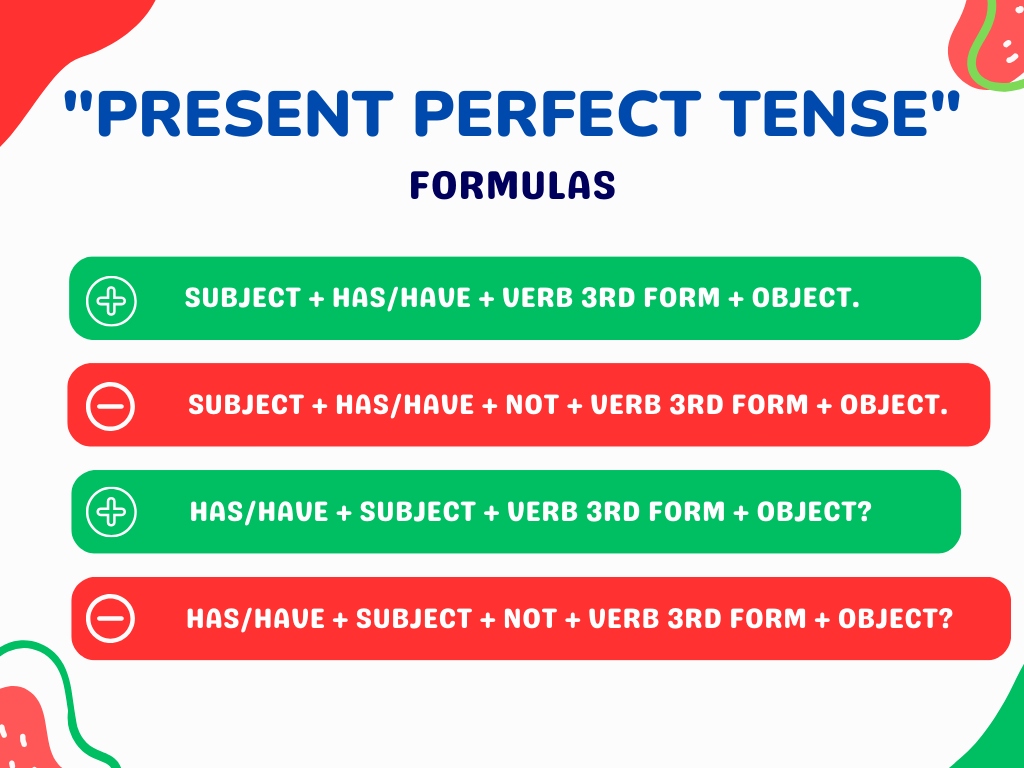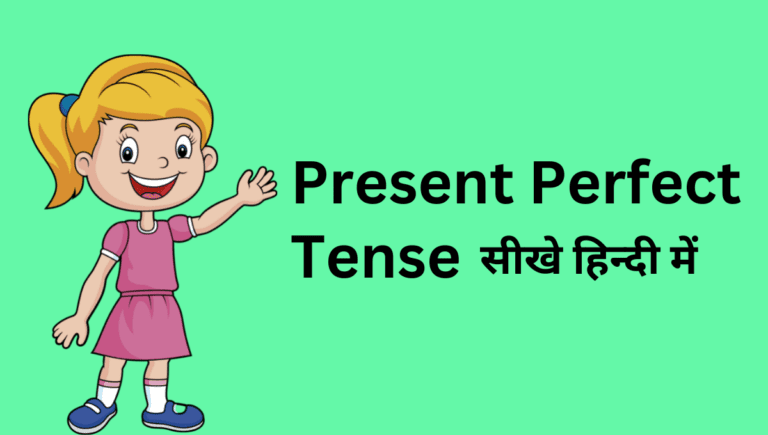हैलो दोस्तों इस पोस्ट में हम प्रेजेंट परफेक्ट टेंस को हिन्दी में (present perfect tense in Hindi) सीखेंगे। और साथ ही साथ present perfect tense के सूत्र (formula), नियम (rules) और वाक्यों में उदाहरण (sentences example) भी सीखेंगे। इससे पहले हमने Present Continuous Tense सीखा था।
तो चलिए इस पोस्ट (present perfect tense in Hindi and English) में जानते है, की present perfect tense क्या होते है। इनका उपयोग कब किया जाता है, और हम इनकी पहचान कैसे कर सकते है।
Present perfect tense in Hindi
Present perfect tense (पूर्ण वर्तमानकाल), present tense (वर्तमान काल) का तीसरा tense (काल) है। जैसा कि आप नीचे देख सकते है:
वर्तमान काल (Present tense) के चार प्रकार-
- Simple present tense (सामान्य वर्तमानकाल)
- Present continuous tense (अपूर्ण वर्तमानकाल)
- Present perfect tense (पूर्ण वर्तमानकाल)
- Present perfect continuous tense (पूर्ण-अपूर्ण वर्तमानकाल)
Present perfect tense की परिभाषा
पूर्ण वर्तमानकाल की परिभाषा – वह काल जिसमें कोई कार्य वर्तमान में पूरा होता है। उस काल (tense) को Present perfect tense (पूर्ण वर्तमानकाल) कहते है। इस टेंस में कोई काम वर्तमान समय में पूरा होता है। तथा काम के शुरू होने का समय नहीं दिया होता है।
जैसे-
- He has eaten the food. (उसने खाना खा लिया है।)
- I have played cricket. (मैंने क्रिकेट खेल लिया है।)
Present perfect tense meaning in Hindi
प्रेजेंट परफेक्ट टेंस (Present perfect tense) का हिंदी अर्थ होता है- “पूर्ण वर्तमानकाल”।
Present perfect tense की पहचान
जिन हिन्दी वाक्यों के अंत में चुका है, चुकी है, चुके है, चुके हो अथवा या हूँ, यी हूँ, ये हैं, ये हो, या है, ई हैं आदि शब्द आते है। वहाँ present perfect tense होता है। इस टेन्स में कार्य के पूर्ण होने का बोध होता है।
सामान्य शब्दों में कहे तो present perfect tense के वाक्यों में कार्य वर्तमान समय में पूरा हो जाता है। जैसे- “बच्चे स्कूल जा चुके है।” इस वाक्य में बच्चों द्वारा स्कूल जाने का कार्य वर्तमान में हो चुका है।
Present perfect tense का उपयोग
पूर्ण वर्तमान काल (Present perfect tense) टेंस का उपयोग करते समय हम निम्न बातों का ध्यान रखना चाहिए:
- इस टेंस के सभी वाक्यों (positive, negative, interrogative, negative-interrogative) में verb की 3rd form का उपयोग किया जाता है।
- इस टेंस में कार्य वर्तमान समय में पूर्ण होता है।
- इस टेंस में verb की 3rd form के साथ has/have का उपयोग किया जाता है।
Has व have का उपयोग इस प्रकार किया जाता है:
Has – he, she, it, name, व एकवचन कर्ता के साथ
Have – I, we, you, they, व बहुवचन कर्ता के साथ
Present perfect tense के formulas

Subject + has/have + verb 3rd form + object. (for positive sentence)
Subject + has/have + not + verb 3rd form + object. (for negative sentence)
Has/Have + subject + verb 3rd form + object? (for interrogative sentence)
Has/Have + subject + not + verb 3rd form + object? (for interro-negative sentence)
{Or}
Has/Have + not + subject + verb 3rd form + object? (for interro-negative sentence)
Types of sentences in present perfect tense
Present perfect tense के वाक्यों को चार भागों में बाँटा जा सकता है:
Present perfect tense sentences in hindi –
- Positive sentence (सकारात्मक वाक्य)
- Negative sentence (नकारात्मक वाक्य)
- Interrogative sentence (प्रश्नवाचक वाक्य)
- Negative Interrogative sentence (नकारात्मक प्रश्नवाचक वाक्य)
Positive sentence
Formula
Subject + has/have + verb 3rd form + object.
Example in Hindi and English
1.) मैं इस विषय के बारे में बोल चुका हूँ।
1.) I have spoken about this subject.
2.) हम स्कूल से घर आ चुके है।
2.) We have come home from school.
3.) मैंने विनय से बात कर ली है।
3.) I have spoken to Vinay.
4.) तुमने उसकी बेइज्जती की है।
4.) You have insulted him.
5.) कारपेंटर ने अलमारी बना ली है।
5.) The carpenter has made the wardrobe.
ऊपर दिए गए वाक्यों में हमने has/have के साथ verb की 3rd form का उपयोग किया है।
Negative sentence
Formula
Subject + has/have + not + verb 3rd form + object.
Example in Hindi and English
1.) मैं इस विषय के बारे में नहीं बोला हूँ।
1.) I have not spoken about this subject.
2.) हम स्कूल से घर नहीं आये है।
2.) We have not come home from school.
3.) मैंने विनय से बात नहीं की है।
3.) I have not spoken to Vinay.
4.) तुमने उसकी बेइज्जती नहीं की है।
4.) You have not insulted him.
5.) कारपेंटर ने अलमारी नहीं बनाई है।
5.) The carpenter has not made the wardrobe.
ऊपर दिए गए वाक्यों में हमने has/have और not के साथ verb की 3rd form का उपयोग किया है।
Interrogative sentence
Formula
Has/Have + subject + verb 3rd form + object?
Note- Interrogative sentence में हमेशा प्रश्नवाचक चिन्ह (?) लगता है।
Example in Hindi and English
1.) क्या मैं इस विषय के बारे में बोल चुका हूँ?
1.) Have I spoken about this subject?
2.) क्या हम स्कूल से घर आ चुके है?
2.) Have we come home from school?
3.) क्या मैंने विनय से बात कर ली है?
3.) Have I spoken to Vinay?
4.) क्या तुमने उसकी बेइज्जती की है?
4.) Have you insulted him?
5.) क्या कारपेंटर ने अलमारी बना ली है?
5.) Has carpenter made the wardrobe?
ऊपर दिए गए वाक्यों में हमने has/have के साथ verb की 3rd form का उपयोग किया है, और अंत में प्रश्नवाचक चिन्ह(?) लगाया है।
Negative Interrogative sentence
Formula
Has/Have + subject + not + verb 3rd form + object?
{Or}
Has/Have + not + subject + verb 3rd form + object?
Note-
- Negative interrogative sentence में हमेशा प्रश्नवाचक चिन्ह (?) लगता है।
- Negative interogative sentence को interro-negative sentense भी कहते है।
Example in Hindi and English
1.) क्या मैं इस विषय के बारे में नहीं बोला हूँ?
1.) Have I not spoken about this subject?
2.) क्या हम स्कूल से घर नहीं आये है?
2.) Have we not come home from school?
3.) क्या मैंने विनय से बात नहीं की है?
3.) Have I not spoken to Vinay?
4.) क्या तुमने उसकी बेइज्जती नहीं की है?
4.) Have you not insulted him?
5.) क्या कारपेंटर ने अलमारी नहीं बनाई है?
5.) Has the carpenter not made the wardrobe?
ऊपर दिए गए वाक्यों में हमने has/have और not के साथ verb की 3rd form का उपयोग किया है, और अंत में प्रश्नवाचक चिन्ह(?) लगाया है।
Present perfect tense examples in Hindi
नीचे आपको कुछ ओर प्रेजेंट परफेक्ट टेंस के हिन्दी उदाहरण (present perfect tense examples in Hindi) दिये गये है:
1.) क्या तुमने उसका काम कर दीया है?
1.) Have you done his work?
2.) वह बाइक से गिर चुका है।
2.) He has fallen off the bike.
3.) विद्यार्थी परीक्षा की तैयारी कर चुके है।
3.) Students have prepared for the exam.
4.) उसने अपने कमरे की सफाई नहीं की है।
4.) He has not cleaned his room.
5.) मम्मी ने सबके लिए खाना बना लिया है।
5.) Mom has cooked food for everyone.
6.) शरारती बच्चे शिक्षक को बहुत परेशान कर चुके है।
6.) Mischief children have troubled the teacher a lot.
7.) दुश्मन पूरी योजना को समझ चुका है।
7.) The enemy has understood the entire plan.
8.) आयुषी परीक्षा में उत्तीर्ण नहीं हुई है।
8.) Ayushi has not passed in the examination.
9.) क्या तारे आसमान में दिखाई दे चुके है?
9.) Have the stars appeared in the sky?
10.) वह प्रतियोगिता में नहीं जीत चुका है।
10.) He has not won the competition.
Present perfect tense FAQs
प्रेजेंट परफेक्ट टेंस (Present perfect tense) का मतलब होता है – “पूर्ण वर्तमानकाल”।
प्रेजेंट परफेक्ट टेंस (Present perfect tense) में सहायक क्रिया के रूप में has व have का उपयोग किया जाता है।
Conclusion
इस पोस्ट में हमने प्रेजेंट परफेक्ट टेंस को हिन्दी और अंग्रेजी में (present perfect tense in Hindi to English) सिखा। और साथ ही प्रेजेंट परफेक्ट टेंस के फॉर्मूला और वाक्यों में उदाहरण सीखे।
हमे आशा है, की आपको यह पोस्ट (present perfect tense in Hindi) पसंद आयी होगी। आपको यह पोस्ट कैसी लगी हमें कमेन्ट में जरूर बताए। अगर आपका इस पोस्ट से संबंधित कोई सवाल या सुझाव हो तो आप कमेन्ट में पूछ सकते है।
Present Tense (वर्तमानकाल)




